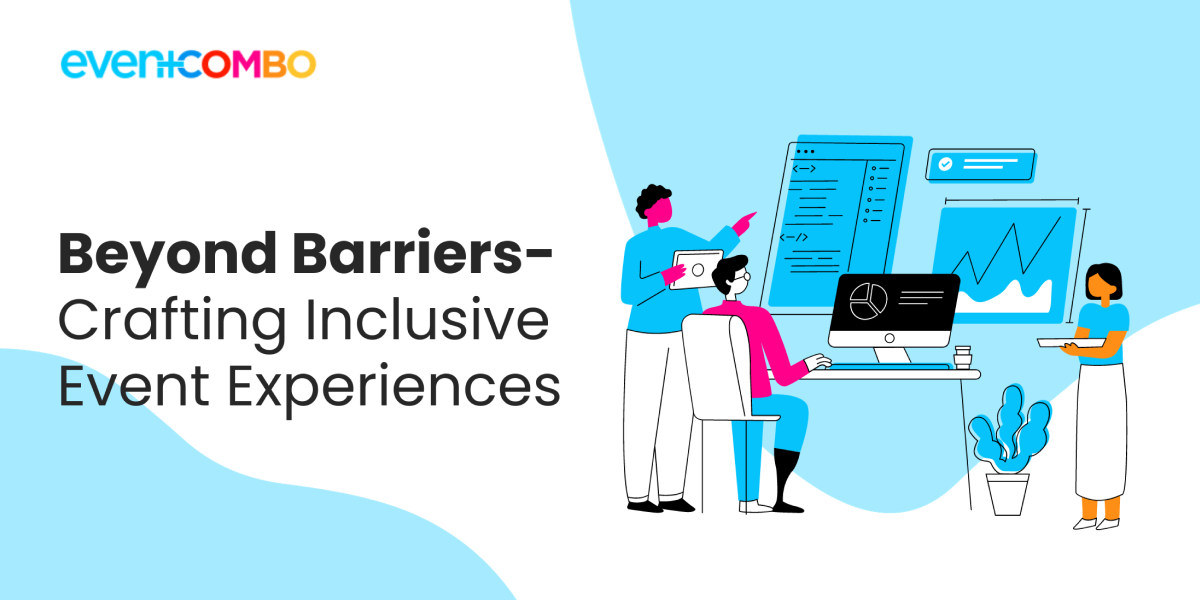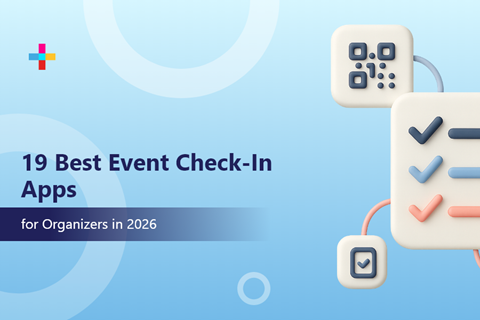Inclusive Event Planning: Elevating Accessibility to Inspire All

Nov 10, 2023 Shruti Shah
According to the World Health Organization (WHO), an estimated 1.3 billion people grapple with significant disabilities. To put it in perspective, this accounts for a substantial 16% of the global population, or in simpler terms, one in every six individuals. It is quite evident that the ever-evolving world of event planning has recognized the pressing need for accessibility, making it a fundamental element in crafting memorable experiences that cater to everyone. Regardless of the event's format or nature, it is crucial that we emphasize that accessibility is not an afterthought but rather a cornerstone.
In this blog, let’s explore the world of event planning through the lens of accessibility.
Understanding Accessibility
Accessibility, within the context of event planning, signifies a purposeful dedication to ensuring that every individual, irrespective of their physical capabilities, sensory experiences, or cognitive variances, can actively participate and engage in the event. It transcends mere legal requirements, embodying a sincere commitment to inclusivity and hospitality, where each attendee is warmly embraced and appreciated. The essence of accessibility should imbue the entirety of the event, spanning from its inception and logistical aspects to execution and post-event follow-up.
The Importance of Accessibility
The importance of accessibility in event planning is not merely a matter of ethics; it forms the very core of an event's essence – bringing people with shared goals together. Inclusivity widens your potential audience, enhances attendance, and contributes to the event's success. Moreover, attendees who have positive, inclusive experiences are more likely to become vocal advocates, strengthening your event's reputation and brand’s credibility. Let's consider the significance of accessibility in events for various disabilities and introduce statistics to highlight the scope:
- Mobility Disabilities: People with mobility impairments require features like ramps, elevators, and accessible seating.
- Visual Impairments: Attendees with visual impairments require braille signage, large print materials, and clear navigation pathways for clear orientation.
- Hearing Impairments: Individuals with hearing impairments may require sign language interpreters, captioning, or assistive listening devices and stellar on-site support.
- Cognitive Disabilities: Cognitive disabilities include conditions like autism and dyslexia. A more inclusive approach may involve sensory-friendly spaces, more inclusive event programming and communication support.
Practical Steps for Accessibility
Ensuring that your event is genuinely accessible involves a series of strategic actions. Here are some strategies for creating inclusive event environments
- Venue Selection: Opt for venues that prioritize wheelchair accessibility, offer suitable parking, and provide accessible restrooms. Ensure the venue is equipped with essential features like ramps, elevators, and designated seating areas for individuals with disabilities. Additionally, make certain that caregivers have complimentary entry and can easily guide guests. Pay special attention to entry and exit points that are designed to facilitate smooth access.
- Communication: Craft marketing materials and event information in formats that are accessible to all. Ensure that your event website complies with web content accessibility guidelines (WCAG) to cater to individuals with visual impairments. It's worth noting that as per W3Techs, a mere 4.6% of the top 10 million websites currently meet WCAG standards. Remember, your endeavors to create inclusive events can bear fruit only when your invitations reach a wide and diverse audience.
- Signage: Utilize clear and easily readable signage featuring high-contrast visuals and generously sized fonts. Incorporate braille or tactile components to assist those with visual impairments. Surprisingly, the World Blind Union reports that less than 10% of public and commercial buildings worldwide offer tactile signage. It's essential to recognize and meticulously implement these details, which often go unnoticed by the general public.
- Transportation: Ensure the availability of accessible transportation options, including shuttle services equipped with wheelchair ramps. Being close to public transportation hubs provides an added advantage. It's worth noting that in the United States, approximately 25.5 million adults face travel limitations due to disabilities.
- Accommodations: Forge partnerships with hotels and lodging establishments to guarantee the availability of accessible rooms and facilities. In cases where accommodations are integrated into the venue package, ensure the allocation of disability-friendly rooms. Additionally, provide a curated list of recommended accessible lodging options for out-of-town attendees.
- Seating Arrangements: While you may have addressed many aspects, the seating arrangements hold a pivotal role. It is crucial to allocate dedicated seating areas for individuals with special needs, along with their companions and service animals. These designated areas should not only provide an unobstructed view but also be conveniently situated close to accessible entrances and exits. Additionally, facilitating entry and exit from any side simplifies the process for these individuals, and it's imperative to ensure there is adequate space for service animals within these allocated seating sections.
- Event Layout: When planning the event layout, it's essential to prioritize accessibility. This means designing wide walkways that minimize tripping hazards and taking into account various sensory sensitivities, such as sensitivity to lights and sound. It's crucial to ensure that accessible aisles are not used as walkways for other attendees, preventing disruptions for everyone. Additionally, thought should be given to session placement to minimize excessive movement and avoid inconveniencing attendees by situating rooms too far apart within the venue.
- Staff Training: Ensure that your on-site event staff receive comprehensive training in disability awareness and customer service. Equip them with the necessary skills to provide assistance to attendees with disabilities and to respond effectively to their specific needs and concerns. It's important to recognize that, despite the presence of event technology and various facilities, the on-site staff can truly make or break the overall attendee experience.
- Accessibility Services: Consider offering a variety of accessibility services, including sign language interpreters, captioning, and assistive listening devices for attendees with hearing impairments. While it's true that providing these services incurs costs, the recognition your brand receives for its compassion and commitment to inclusivity can be immeasurable. Moreover, ensuring that your events are accessible to everyone is not only a matter of humanitarian concern but also a testament to your organization's values.
- Feedback Mechanism: Implement a robust feedback system that empowers attendees to report accessibility concerns or offer improvement suggestions. Act promptly on this feedback to enhance the quality of future events. Real-time feedback is essential in ensuring that all guests, especially those with special needs, can fully enjoy the event.
Harnessing Event Technology for Enhanced Accessibility
How to plan events that inspire inclusivity? Actually, incorporating event technology significantly improves accessibility standards. By designing dynamic registration pages that cater to all and collect relevant information for an improved event experience analysis, you can create an inclusive environment. From utilizing mobile apps for real-time event updates to embracing virtual reality experiences that make events accessible to those with limited mobility, technology can become a transformative force in crafting inclusive events.
Today, inclusivity is an ever-expanding goal and event planners have a unique opportunity to lead the way. Event planning with a focus on accessibility is a multifaceted journey that requires dedication, empathy, and strategic foresight. It's crucial to emphasize that the weight of effort should be placed on the planning phase because a well-prepared foundation ensures smooth execution on-site. Accessibility is not a mere checkbox to tick off; it's a mindset that celebrates diversity and reflects the core values of a society that embraces the richness of human experiences.
Eventcombo’s mission is to craft experiences that resonate with all, leaving no one behind, and touching the hearts of everyone in attendance. Book a demo with us - https://bit.ly/3R9bkuP




